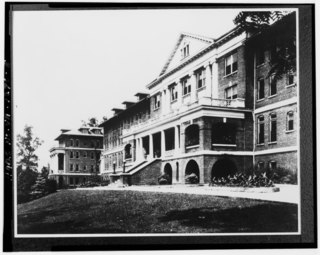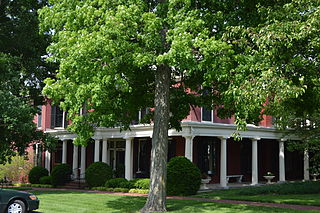
Stanford is a home rule-class city in Lincoln County, Kentucky, United States. It is one of the oldest settlements in Kentucky, having been founded in 1775. Its population was 3,487 at the 2010 census and an estimated 3,686 in 2018. It is the county seat of Lincoln County. Stanford is part of the Danville Micropolitan Statistical Area.

Stephen Rea is an Irish film and stage actor. Rea has appeared in films such as V for Vendetta, Michael Collins, Interview with the Vampire and Breakfast on Pluto. Rea was nominated for an Academy Award for his lead performance as Fergus in the 1992 film The Crying Game. He has during later years had important roles in the Hugo Blick TV series The Shadow Line and The Honourable Woman, for which he won a BAFTA Award. In 2020, he was listed at number 13 on The Irish Times list of Ireland's greatest film actors.
The Methodist Episcopal Church, South was the Methodist denomination resulting from the 19th-century split over the issue of slavery in the Methodist Episcopal Church (MEC). Disagreement on this issue had been increasing in strength for decades between churches of the North and South; in 1844 it resulted in a schism at the General Conference of the MEC held in Louisville, Kentucky.

Asbury University is a private Christian university in Wilmore, Kentucky. Although it is a nondenominational school, the college's foundation stems from a Wesleyan-Holiness tradition. The school offers 50-plus majors across 17 departments. In the fall of 2016, Asbury University had a total enrollment of 1,854: 1,640 traditional undergraduate students and 214 graduate students. The campus of Asbury Theological Seminary, which became a separate institution in 1940, is located across the street from Asbury University.

Kentucky Wesleyan College (KWC) is a private Methodist college in Owensboro, Kentucky. The college is known for its liberal arts programs. Fall 2018 enrollment was 830 students.
Semesa Koroikilai Sikivou, CBE was a Fijian academic, politician, and diplomat.

The geology of the Ohio River, with but a single series of rapids halfway in its length from the confluence of the Monongahela and Allegheny rivers to its union with the Mississippi, made it inevitable that a town would grow on the site. Louisville, Kentucky was chartered in the late 18th century. From its early days on the frontier, it quickly grew to be a major trading and distribution center in the mid 19th century, important industrial city in the early 20th, declined in the mid 20th century, before revitalizing in the late 20th century as a culturally-focused mid-sized American city.

Purnia division is an administrative geographical unit of Bihar state of India. Purnia is the administrative headquarters of the division. The division consists of Purnia district, Katihar district, Araria district, and Kishanganj district. It was established in 1990. It is also known as Seemanchal. It is a part of the Kosi—Seemanchal subregion of the cultural Mithila region.
Covington Latin School is a co-educational Catholic college-preparatory high school in Covington, Kentucky, USA, offering a classical education. Since its inception in 1923, the school has operated under the Diocese of Covington; it is located next to the Cathedral Basilica of the Assumption.
Asbury Theological Seminary is an evangelical Christian seminary in Wilmore, Kentucky. It is the largest seminary in the Wesleyan tradition and advocates egalitarianism, giving equal status for men and women in ministerial roles and for ordination. It is also known for popularizing the New Perspective on Paul theory in America. It is accredited by the Commission on Colleges of the Southern Association of Colleges and Schools and the Association of Theological Schools in the United States and Canada (ATS).

Shamrock Diaries is the seventh studio album by British singer-songwriter Chris Rea, released in 1985. This album represents the beginning of a creative and commercial zenith for Rea. Shamrock Diaries was a huge seller in Europe, reaching the top 20 in several countries including Ireland, West Germany, Czechoslovakia, Sweden and the United Kingdom, and spent forty two weeks in the Dutch charts, peaking at No. 3. The album was also successful in Australia, where it charted in the top 50. Stainsby Girls became Rea's first Top 30 single since 1978's Fool If You Think It's Over. In 1988, Magnet Records was taken over by Warner Bros Records, who re-released Shamrock Diaries with a significantly remixed version of Josephine. The original version was used in the 2019 deluxe re-issue of the album.

Wesley Theological Seminary is a United Methodist Church seminary in Washington, D.C.. It was founded in 1882.

Louisville Presbyterian Theological Seminary, currently branded as Louisville Seminary, is a seminary affiliated with the Presbyterian Church (USA), located in Louisville, Kentucky. It is one of ten official PC(USA) seminaries, though it currently identifies as an ecumenical seminary, with recent student enrollment representing many faith traditions, including Cooperative Baptist Fellowship, United Methodist Church, American Baptist Churches USA, African Methodist Episcopal Church, Evangelical Lutheran Church in America, Unitarian Universalist Association, Evangelical Covenant Church, African Methodist Episcopal Zion Church, National Baptist Convention, USA, Inc., Christian Methodist Episcopal, Christian Church, United Church of Christ, Community of Christ, and Episcopal Church (USA), among others.
Settlement schools are social reform institutions established in rural Appalachia in the early 20th century with the purpose of educating mountain children and improving their isolated rural communities.

Sullins College was a former Methodist, female, junior college in Bristol, Virginia, United States, founded about 1868 and named for David Sullins, a Methodist minister. It ceased operations after the class of 1976 graduated.
John Wesley Hughes was an American minister. He was born in Owen County, Kentucky and was converted at the age of sixteen in a Methodist revival meeting in an old schoolhouse. Hughes attended Kentucky Wesleyan College in Millersburg, Kentucky, and served as a pastor in the Kentucky Conference of the Methodist Church before pursuing further education at Vanderbilt University in Nashville, Tennessee.

Science Hill School, originally known as the Science Hill Female Academy was founded on March 25, 1825 by Julia A. Tevis as a female preparatory school. In 1975 the school was placed on the National Register of Historic Places and in 1978, it was opened as a restaurant known as the Science Hill Inn by Donna Gill and Tim Barnes.

Martha Watts was an American missionary and school teacher who established four educational facilities in Brazil. Educated in Kentucky at the Louisville Normal School, she was in the first graduating class in the early 1870s and became a teacher, working in the public schools. After joining the Broadway Methodist Church in 1874, Watts joined a youth missionary society and founded a Sunday school class. In 1881, after applying to the Women's Board of Foreign Missions, she was accepted as the second woman from the United States to act as a foreign missionary and was the first woman to be sent to Brazil.

Belle Harris Bennett, led the struggle for and won laity rights for women in the Methodist Episcopal Church, South. She was the founding president of the Woman's Missionary Council of the Southern Methodist Church. Much of her work including fundraising and organizational efforts to provide higher education for a new professional class of social workers and community organizers in the Southern Methodist Church in the U.S. and abroad. Her carefully collaborative support for African Americans and immigrants was considered radical at that time by Southerners. She was a suffragist and supporter of temperance as well.

Margaret Rose Sanford was an American civic leader, teacher, and philanthropist who, as the wife of Terry Sanford, served as First Lady of North Carolina from 1961 to 1965. Prior to entering public life, she worked as a teacher in North Carolina and Kentucky. As first lady, Sanford hosted the first annual North Carolina Symphony Ball in 1961, established a library of North Carolinian books at the North Carolina Executive Mansion, and planted a rose garden on the mansion's grounds. She was the first governor's wife to decorate the Governor's Western Residence in Asheville. Sanford sent her children to the first racially integrated public elementary school in Raleigh, North Carolina while the family lived in the executive mansion. She served on the board of the Methodist Home for Children, the North Carolina School of the Arts, the Stagville Plantation Restoration Board, and East Carolina University. She was also a member of the Education Commission of the States and the Defense Department Advisory Committee on Women in the Services. While Sanford's husband served as president of Duke University, she was appointed by Governor Jim Hunt to serve on a delegation of university faculty and administrators to China in 1975.














